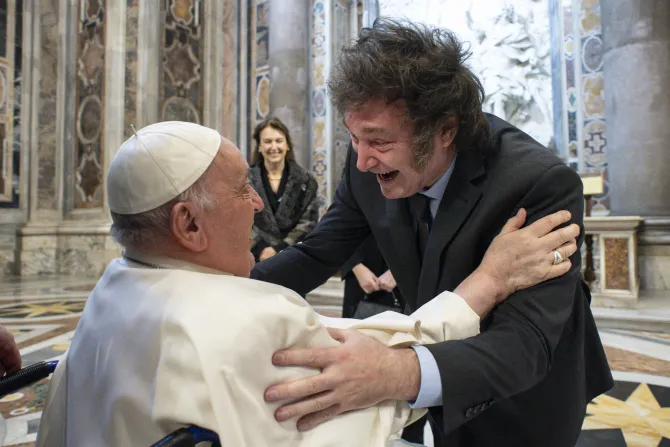Pope Francis and Argentina’s President Javier Milei celebrate after the canonization Mass of Argentina’s first female saint, María Antonia of St. Joseph, on Feb. 11, 2024. | Vatican Media
Pope Francis canonised Argentina’s first female saint, María Antonia of St. Joseph — known affectionately in the pope’s home country as “Mama Antula” — in a Mass in St. Peter’s Basilica on Sunday.
Argentina’s President Javier Milei sat in the front row to the pope’s right during the canonisation today and embraced the pope at the end of the Mass.
Mama Antula (1730-1799) was a consecrated laywoman who promoted Ignatian spirituality, founding Buenos Aires’ House for Spiritual Exercises at a time of widespread hostility to the Jesuit order.
Pope Francis praised the Argentine saint as “a model of apostolic fervour and boldness” for travelling “thousands of miles on foot through deserts and dangerous roads” to bring people to God.
“Brothers and sisters, God loves us … and if we let Him touch us, we too, by the power of His Spirit, can become witnesses of the love that saves,” he said.

The Jesuit pope from Argentina highlighted how Mama Antula persevered in safeguarding Ignatian spirituality after the Society of Jesus was suppressed and its priests expelled from South America.
“When the Jesuits were expelled, the Holy Spirit ignited in her a missionary flame based on trust in Providence and perseverance,” he said.
Pope Francis, the former archbishop of Buenos Aires, has said that he wants to visit Argentina in the second half of this year. Francis has not returned to his homeland since becoming pope in 2013.
The pope met with the new Argentinian president for the first time briefly at the canonization. Milei, who called Francis an “imbecile” during his campaign, gave the pope a hug after shaking his hand at the end of Mass.

The two are scheduled to have a private meeting at the Vatican on Monday before Milei meets with Italian Prime Minister Giorgia Meloni.
Pope Francis has said that he sees the meeting with Milei on Monday as an opportunity to “start a dialogue” and has indicated that he was not offended by the insults that Milei had hurled against him before he was elected president, saying, “words during an election campaign come and go.”
Milei, who was raised Catholic, has recently embraced aspects of Judaism, even suggesting the possibility that he could convert. After arriving in Rome from Israel on Friday, Milei visited the Basilica of Saint Peter in Chains and posted a photo of himself looking at Michelangelo’s statue of Moses inside the church on Instagram.
After assuming office as president in December, Milei issued a formal invitation for Pope Francis to visit Argentina in a letter signed on Jan. 8.

During the canonisation Mass, Pope Francis spoke about the importance of not ostracizing the poor or the weak but of drawing close to them as Jesus did with the lepers he met.
“How many suffering men and women do we meet on the sidewalks of our cities,” Pope Francis said.
“And how many fears, prejudices, and inconsistencies, even among those who are believers and call themselves Christians, contribute to wounding them all the more!”
Pope Francis has praised Mama Antula as an example of charity for her care for “those whom society discards.”
María Antonia was born into a wealthy family in 1730 in Silipica, Santiago del Estero, in northern Argentina. She expressed a fervent desire to serve God at a young age. She spent the early part of her ministry helping parents with the instruction of their children and administering care to the sick and poor.

Following the expulsion of the Jesuits from the Spanish Empire by King Charles III, she travelled around northern Argentina by foot to safeguard and promote Ignatian spirituality, organizing retreats despite the widespread hostility to the Jesuits.
After the success of these early retreats, she expanded her reach into other regions of Argentina and relocated to Buenos Aires in 1779. While denied permission by imperial authorities to restore the Ignatian tradition, her perseverance paid off when a year later she earned the trust of the local bishop, culminating in the establishment of the House for Spiritual Exercises in Buenos Aires.
She died on March 7, 1799, in Buenos Aires and was buried in the cemetery of the Church of the Pietà there. Her body was later moved inside the church and has become a popular pilgrimage destination.

In his homily, Pope Francis expressed gratitude to Mama Antula for promoting devotion to St. Cajetan, also known as St. Gaetano of Thiene, who is now one of the most popular saints in Argentina.
“Thanks to Mama Antula, this saint, intercessor of Divine Providence, made his way into homes, neighbourhoods, transportation, stores, factories, and hearts to offer a life of dignity through work, justice, and daily bread on the table of the poor,” the pope said.
“Let us pray today to María Antonia, Saint María Antonia de Paz de San José, that she will help us greatly.”
Mama Antula’s feast day will be celebrated on March 7.
Source: CNA

